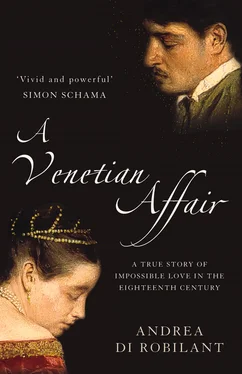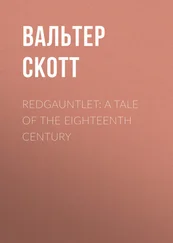1 ...6 7 8 10 11 12 ...21 In the early stages, Andrea had a patronizing tone toward Giustiniana and a tendency to take control of every aspect of their relationship. He was, of course, several years older than she, and it was fairly natural that he should take the lead while she deferred to his judgment. But over the months she grew more confident in her ability to conceal and deceive. And in spite of Andrea’s occasional hectoring, she began to enjoy plotting behind her mother’s back. She took a more active role in planning their meetings and often marveled at her own audacity: “Truly, Memmo, I do not recognize myself. I do things I never would have done. I think in ways so different that I do not seem to be myself anymore.”
It was Giustiniana who eagerly informed Andrea that N., a friend on whom they had worked hard to bring over to their side, had finally agreed to let them meet at his casino , one of the little pleasure houses that were all the rage in those years and were Venice’s very practical answer to a diffuse desire for comfort and pleasure. (There were as many as 150 such casini in the city, which were used as boudoirs, as seditious salons, and—quite often—as discreet love nests.) “I’ve made arrangements for Friday,” she wrote self-confidently. “We can’t see each other before. I didn’t feel I could press him and so I let him choose the date. He has become my friend entirely and confides his worries to me and even vents his domestic frustrations.”
Their excitement grew every day in anticipation of the moments they would spend together. It was not enough anymore to exchange loving glances and signals from afar. If Giustiniana had become much bolder in just a few weeks, it was because her yearning was now so powerful. She longed to be kissed by Andrea, to be held in his arms. And their scheming was finally producing results. Here is Giustiniana, three days before their secret appointment at N.’s casino:
Friday we shall meet—at least we know as much. But my God, how the time in between will seem interminable! And afterward what? Afterward I shall think about our next meeting so that I shall always be having sweet thoughts about you…. Tell me, Memmo, are you entirely happy with me? Is there any way I can give you more? Is there something in my behavior, in my way of life that I might change to suit you better? Speak, for I shall do anything you want. I cannot think of anything more precious than to see you happy and ever closer to me. I never thought it was possible to love with such violence .
The following evening Alvisetto appeared in Giustiniana’s room bearing a reply from her lover. “My soul,” Andrea wrote, “what a complete delight it will be. Love me, adore me…. I deserve it because I know your heart so well. Oh Lord, I am so dying to see you that I am jumping out of my skin.” Alvisetto also handed to Giustiniana a small, delicately embroidered fan—a gift to make the waiting more bearable. In order to avoid raising Mrs. Anna’s suspicions, Andrea suggested that Giustiniana ask her aunt Fiorina to pretend the fan was for her. In the past Mrs. Anna’s sister had shown a certain amount of sympathy for her niece’s predicament. Andrea, always in search of reliable allies, felt this subterfuge would not only allay whatever doubts Mrs. Anna might have about his gift but also give them a sense of how much Aunt Fiorina was prepared to help them in the future.
On Thursday, the day before their meeting, Alvisetto delivered a long, tender letter to Andrea:
And so, my dear Memmo, tomorrow we shall be together. And what, in the whole world, could be more natural between two people who love each other than to be together? I could go on forever, my sweet. I am in heaven. I love you. I love you, Memmo, more than I can say. Do you love me as much? Do you know I have this constant urge to do well, to look beautiful, to cultivate the greatest possible number of qualities for the mere sake of pleasing you, of earning your respect, of holding on to my Memmo…. Be warned, however, that your love for me has made me extremely proud and vain…. Where does one find a man so pleasant, so at ease in society, yet at the same time so firm, so deeply understanding of the important things in life? Where does one find a young man with such a rich imagination who is also precise and clearheaded in his thinking, so graceful and convincing in expressing his ideas? My Memmo, so knowledgeable in the humanities, so intelligent about the arts, is also a man who knows how to dress and always cuts quite a figure and knows how to carry himself with grace…. he is a man who possesses the gift of being at once considerate and bold. And even if at times he goes out of bounds, he does it to satisfy the natural urges of his youth and his character. And therein lies the path to happiness. You are wild as a matter of principle, as a result of hard reasoning. Aren’t you the rarest of philosophers? …. And what have you done, what do you do to women? Just the other day N. said to me: How did you manage to catch that fickle young man? And I was so proud, Memmo .
As for the fan, she added, “I will ask Fiorina to accept it in my place. I don’t know whether she is on our side or not, but at least she seems willing to fake it.”
The morning after their meeting at N.’s, Giustiniana, enthralled by the sweetest memories of the previous evening, wrote to Andrea entirely in French—not the language she knew best but the one she evidently felt was most appropriate in the lingering afterglow of their reunion:
Ah, Memmo, so much happiness! I was with you for close to two hours; I listened to your voice; you held my hand, and our friends, touched by our love, seem willing to help us more often. After you had left, N. told me how much you love me. Yes, you do love me, Memmo, you love me so deeply. Tell me once more; I never tire of hearing you say it. And the more direct you are, the more charmed I shall be. The heart doesn’t really care much for detours. Simplicity is worth so much more than the most ornate embellishments. You are the most charming philosopher I have ever listened to…. If only I could be free … and tell the world about my love! Ah, let us not even speak of such a happy state. Farewell, I take leave of you now. When shall I see you? Tell me, are you as impatient as I am?
She added teasingly:
Oh, by the way, I have news. My mother received a marriage proposal for me from a very rich Roman gentleman…. Isn’t it terrible, Memmo? Aren’t you at least a little bit jealous? And what if he is as nice as they say … and what if my mother wanted him…. I can’t go on. Not even in jest…. I am all yours, my love. Farewell .
* In order to avoid burdening the general reader with repetitive notes I have not sourced each quotation drawn from the correspondence between Andrea and Giustiniana (unless otherwise specified), hoping that a short note on the various sets of letters, to be found after the text on page 293, will make it easy enough for readers with a bibliographical interest to know where the quotation comes from. The reader may also wish to know that in translating the letters from Italian into English I did my best to preserve their original eighteenth-century flavor, though I eliminated excessive capitalization and made changes in the punctuation in order to facilitate the reader’s ease and comprehension.
* Regardless of political influence, twenty-four families were considered founding families of Venice, and of these, twelve traced their roots to early Christianity and called themselves “apostolic.” The Memmos were among these twelve.
* Montesquieu’s Esprit des lois was published in Venice in 1749. Montesquieu himself had come to Venice to study its laws and system of government. He was run out of town by the inquisitors and legend has it that he threw all his notes into the lagoon as he made his escape toward the mainland. Jean-Jacques Rousseau was also a familiar figure, having been secretary to the French ambassador in Venice in 1743–1744.
Читать дальше












